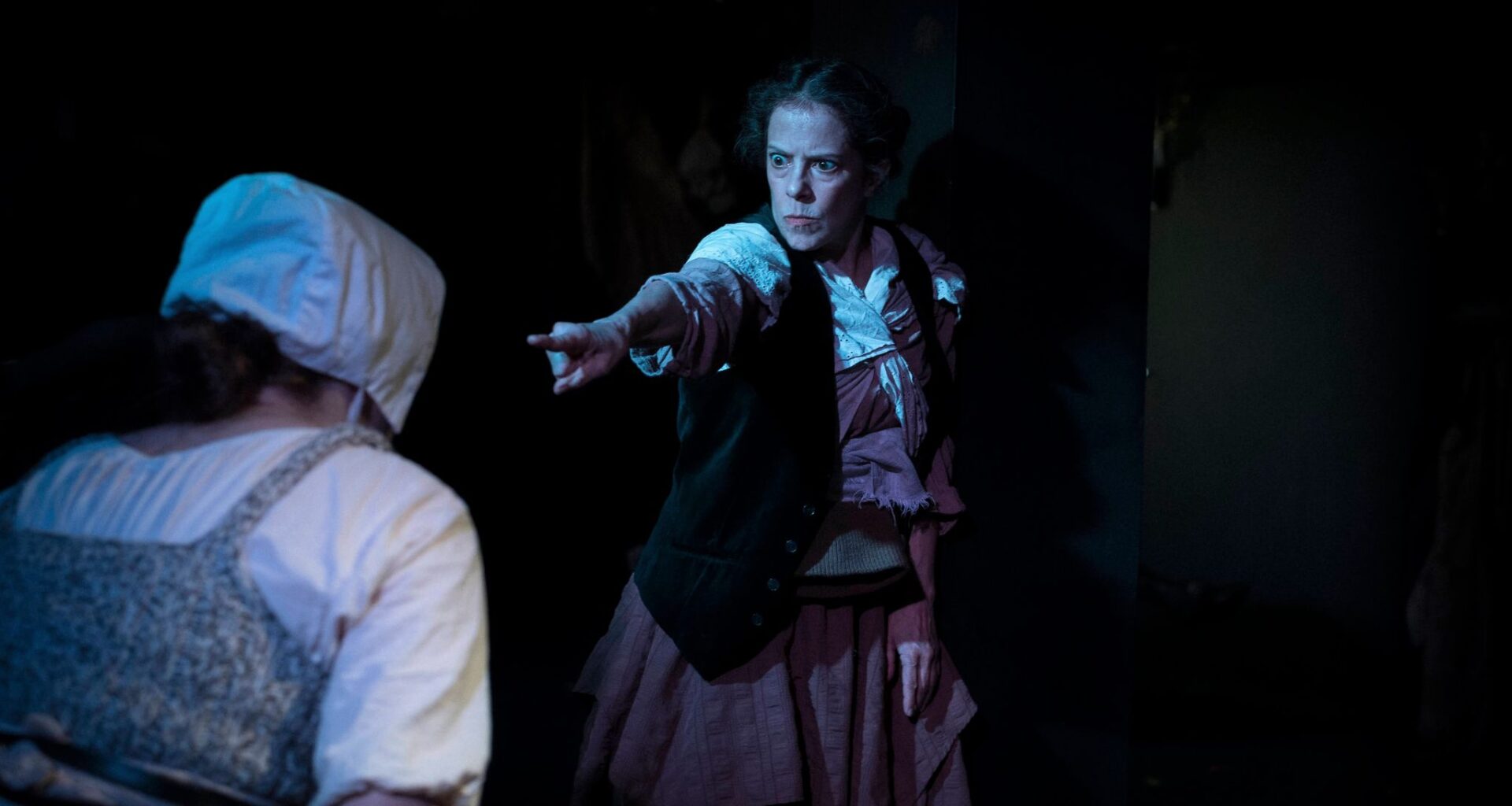Tyler Aguallo as Victor in Theatre Lunatico’s “Frankenstein.”
Denys Bastov/Theatre Lunatico
The creation talks clumsily at first. But with alarming speed, it gathers more data and starts to sound just like us.
Then, when its inventor says it’s still not fully human, its reply devastates: “If there is anything missing in me, it was already missing in you.”

“Frankenstein”: Adapted by Tina Taylor from Mary Shelley. Directed by Lauri Smith. Through Nov. 2. One hour, 50 minutes. $15-$50. La Val’s Subterranean, 1834 Euclid Ave., Berkeley. https://theatrelunatico.wordpress.com
Theatre Lunatico’s “Frankenstein” seems tailor made for our artificial intelligence era, when ChatGPT converses with uncanny naturalism, replicating our own biases yet acting out in ways its technoutopian engineers didn’t always anticipate.
Article continues below this ad
Yet Mary Shelley’s tale is more than 200 years old. So to see Tina Taylor’s new adaptation, as I did on Sunday, Oct. 12, at La Val’s Subterranean, is to feel comfort and dread at the same time.
It might assure you that at least the questions AI poses — What makes us human? Is a lust for knowledge always good? What do we do when our humanlike creations turn against us? — aren’t new. But that sword has a double edge. If we’re still making the same mistakes that Victor Frankenstein (Tyler Aguallo) made, just how bad is it that we’re all essentially carrying Frankenstein’s monster (Sam Heft-Luthy) in our pockets?
Maybe there’s a triple edge, though, as well. If 21-year-old Theatre Lunatico can make its case so unsettlingly as analog theater with volunteer actors in the low-ceilinged basement of a pizza parlor, perhaps unchecked technological progress isn’t the only might or virtue.
Sarah Dunnavant as Justine, left, and Rachel Brown as Dr. Bovet in “Frankenstein.”
Denys Bastov/Theatre Lunatico
Under the direction of Lauri Smith, the Berkeley company inspires heebie-jeebies with tools that Shelley — or humankind’s first storytellers, gathered round a campfire — would recognize.
Article continues below this ad
As a megalomaniacal, grief-addled Victor turns dials and flips switches in his lab, ensemble members stare at him from across the way, whistling through their teeth, buzzing their lips, making the ticking sounds of a clock — or bomb.
The cacophony ratchets up, as the monster, strapped to a rear wall, burlap sack over his head, convulses to life. Soon they’re keening. This is an emergency, and they’re the alarm.
Elsewhere, their syncopated puffs of breath and moaning in the dark help create a world where a vengeful bogeyman could reach out of the shadows at any moment to snuff out life.
Not every member of the ensemble masters lines or distinguishes clearly between multiple characters, and as Victor makes one disastrous decision after another, you might long for some richer psychology to complicate all his yells and huffs.
Tyler Aguallo as Victor, left, and Sarah Jiang as Elizabeth in “Frankenstein.”
Denys Bastov/Theatre Lunatico
Still, other performers bear the whole novel in their beings. Sarah Jiang seems to have morphed her very breath and pulse for the role of Victor’s fragile yet whimsical fiancée Elizabeth. She looks at Victor like she wishes she could pour humanity back into his wild eyes and drink down his hidden thoughts. But, mouselike, she must watch for the strike of his paw at the same time, for at the first brush, she’d shatter.
Article continues below this ad
The foreshadowing is delicious. You taste doom when Frankenstein’s mother (Jennifer Green) bids Elizabeth and Victor to marry as her dying wish, and Victor only looks at Elizabeth with pitiful, earnest concern. Or when Elizabeth, on her wedding day, says she hears “someone walking over my grave.”
Sam Heft-Luthy as the creature, left, and Sarah Jiang as Elizabeth in “Frankenstein.”
Denys Bastov/Theatre Lunatico
AI and Frankenstein’s monster both spin a fantasy of immortality. One is a companion who never tires, never dies; the other, stitched-together corpse pieces zapped to life.
But for even the safest-seeming characters in the play, a grave’s maw lies near and opens wide. Maybe you hear it, too — the rusty-sounding, cord-frayed electric surge that signals the monster is near. Maybe it’s the hum in your pocket.

